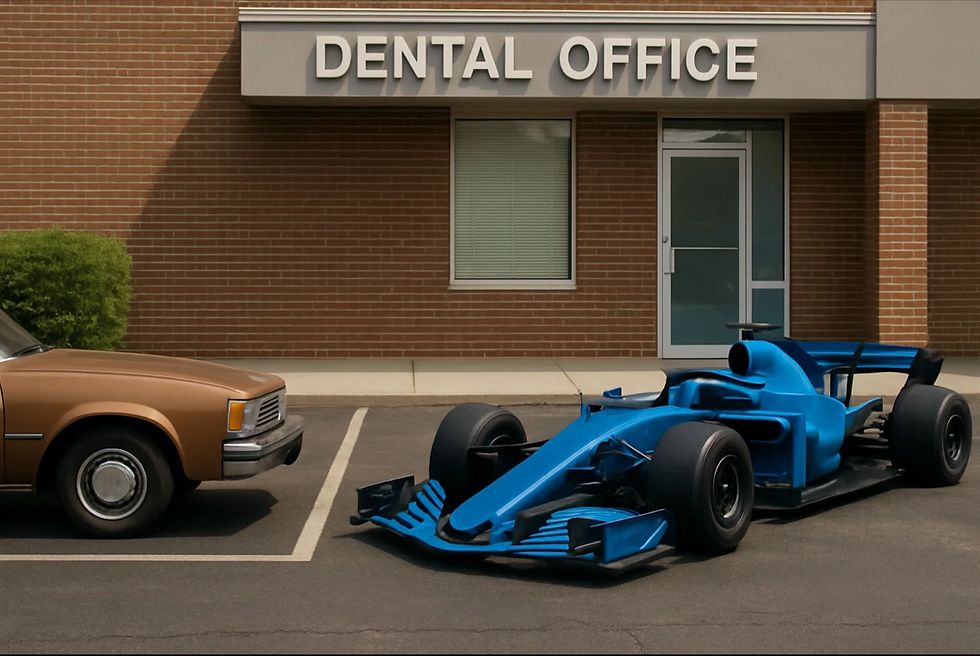The Racecar Trap: Why Dentistry Must Redefine Success
- Robert H. Maccario, MBA
- Sep 22, 2025
- 4 min read
The expertise that made you successful in dentistry may now be your biggest barrier to future success.
By Robert H. Maccario, MBA
The Hidden Cost of Industry Experience
Veteran dentists and vendors often rely on deep experience and proven skills. However, this expertise can become a trap, making it easy to miss innovations by sticking with outdated methods and models.
Just as major camera companies were slow to embrace digital photography, fearing it would erode their film profits, dentistry today risks falling behind by focusing on disease treatment rather than wellness and prevention. Dentistry faces a similar choice today. Those who don't evolve may find themselves vulnerable as the industry shifts toward new models of care and compensation.

Why Advanced Tools Aren't Enough
Imagine the dental industry with access to high-performance, racecar-level technology—built for speed and precision—yet many still use it like a family sedan. That's a major obstacle in many practices and vendor offerings today—advanced tools used with outdated thinking. The real power of these modern tools is unlocked only when the focus shifts to prevention and wellness, making patient well-being the driving force behind quality care and success.
Digital diagnostics, AI imaging, and 3D printing are like the technology of a racecar for dentistry. But without a change in mindset, they become costly upgrades that simply reinforce outdated, reactive models. Just as a race car needs a skilled, forward-thinking driver, dentistry needs to move from "fees for disease"—the sicker the patient, the more production—to optimizing patient wellness to truly benefit from these advancements.
The Wellness Journey vs. Disease Destination Model
The traditional dental model measures success by procedures completed—crowns, fillings, and treatments—focusing on disease as the endpoint. This often leads to technology aimed mainly at detection and treatment, while prevention can be overlooked.
In contrast, wellness is a journey. Wellness is dynamic—it is not a static condition. It is about ongoing, collaborative care focused on sustaining lifelong health. In today's consumer-driven environment, success is increasingly defined by health outcomes and proactive optimization, rather than simply the number of procedures.
For practitioners, this means becoming a trusted resource for the wellness journey, utilizing technology and science to predict and prevent issues. For vendors, it's not about offering a product or piece of equipment—it is about offering wellness solutions that add value through prevention, not just more interventions.
Medicine 3.0 in Dentistry
Drawing from Dr. Peter Attia's "Outlive," healthcare is evolving from Medicine 2.0—which focuses on treating disease after it appears ("fees for disease")—to Medicine 3.0, which emphasizes prevention and long-term health value for patients. This transformation has direct implications for the future of dentistry.
The Transformation Matrix
Every practice falls into one of four categories based on two key factors: its operational mindset and its technological adoption. Only one leads to true transformation:
1. Existing Rules, 2.0; Traditional Competencies, 2.0:
Focus: Managing costs, treating disease as it appears.
Outcome: The sicker the patient, the more production.
Problem: This approach is becoming outdated in a Medicine 3.0 world.
2. Existing Rules, 2.0; New Competencies, 3.0:
Focus: Using new science and technology, but still within the old, cost-focused system.
Outcome: Technology is valued for its ROI, not for the value to the patient.
Problem: You won't unlock the full value of new advances for patients or your practice.
3. New Rules, 3.0; Traditional Competencies, 2.0:
Focus: Shifting to value creation and systems thinking, but still using old, disease-focused skills.
Outcome: May boost short-term production, but risks locking you into an outdated model as patient and payment expectations change.
Problems: Recurring obstacles to implementation.
4. New Rules, 3.0; New Competencies, 3.0:
Focus: Systems thinking, value creation, and fully leveraging new science and technology.
Outcome: One that delivers the most value to patients and keeps your practice future-ready.
Problem: Requires a new practice model and mindset to leverage the full value vendors have built into new science and technology.
The Critical Decision Point
Dentistry faces a defining moment. The industry must shift from procedure-based care to wellness partnerships. Success should be measured by long-term patient health, not just treatment volume. This mindset shift is crucial for the survival and recognition of dentistry as a vital part of comprehensive healthcare.
Vendors and practices that focus on prevention and ongoing care build stronger patient relationships, more stable revenue, and deliver better health outcomes. Everyone wins: patients, providers, and vendors.
Those ready to embrace this transformation—from reactive treatment to proactive wellness partnerships—will discover opportunities for enhanced patient outcomes, sustainable growth, and industry leadership. The technology exists, the pathway is clear, and patient demand for wellness-focused care continues to accelerate.
The question isn't whether dentistry will transform—it's whether you'll lead the change or be left behind.
Ready to Transform Your Practice with Transformational Positioning?
Whether you're a dentist looking to implement current technologies or a dental vendor wanting to coach your dentist clients on this proven strategy, we can help you make the transition seamlessly.
Get personalized guidance on navigating the complexities of new technologies, training your team, and positioning your practice as essential healthcare.
Contact us today:
· Visit: www.dental-mba.com
· Email: maccario@dental-mba.com
Start attracting wellness-focused patients and building lasting relationships based on health outcomes—not just dental procedures.


Comments